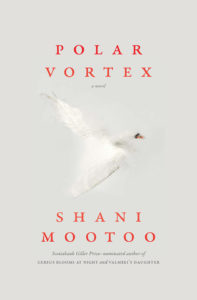June 26, 2020
Five Little Indians, by Michelle Good

‘Lucy leaned back in her chair, hands folded in her lap. “They call us survivors.” “Yeah.” “I don’t think I survived. Do you?”‘
Cree writer Michelle Good’s debut novel, Five Little Indians—winner of the HarperCollins UBC Prize for Best New Fiction, Good earning her MFA at UBC while also practising as a lawyer—is the story of five Indigenous young people who were taken from their families as children and grew up at a remote church-run residential school where they were subject to abuse and deprivation, and then cast back out into the world with nothing as they came of age—with no skills, no community or ancestral ties. Nothing but trauma, and then what happens next? And the novel is the answer to that question.
Set in Vancouver’s Downtown Eastside during the 1960s and decades that follow, Five Little Indians weaves together the stories of Kenny (once notorious for his escapes from the school, a pattern that continues), Maisie (a mother figure for the others, but unable to comfort herself), Lucy (who finds meaning in motherhood), Clara (who finds herself in the American Indian Movement and connecting with the teachings of an elder), and Howie (who struggles to stay out of jail).
The first 100 pages are hard-going, not just because of the trauma they convey, but because the reader is still getting a sense of novel’s structure and the characters themselves too seem to be finding themselves, their feet, and are not as developed as they’ll be in the rest of the book. I will admit that I was wary during these pages that this would be a novel that worked for me, but I am so glad I kept going. Because when Clara’s character takes her turn telling the story, all at once the novel is injected with a furious momentum and energy, the writing in these chapters so artful and confident, and it charges the remainder of the book with narrative magic. And we see that these characters find ways to support each other, to save themselves, to keep going and try to survive and thrive. And sometimes they succeed, and sometimes they don’t.
The point of a book with five protagonists is that there is never just one story, or maybe that one story turns into a different story for every kind of person. This novel also complicates the idea of survival, which is more meaningful in theory than practice, a process that never ends, and which can be impossible. Many of us readers like tidy endings, a story of healing, resolution, but for those who carry the traumatic legacy of residential schools, there is often no such thing. Because how does one reconcile the irreconcilable?
But the end of the book, these characters were firmly lodged in my head, their voices, their connections, their pain and their joys. Powerful and deeply felt, Five Little Indians is both a good read and a literary achievement.
June 17, 2020
The Last Goldfish and In the Shade
“Good reviews…prompt me to borrow a recently-published book on grief from the library. I read the acknowledgements, glance at the author’s photo, and skim the table of contents. Partner, child, parent. Not a word about friends, which causes me to toss it onto the pile of books on my night table.” —Marg Heidebrecht, In the Shade
Thankfully, there is no reason related to my own life for me to pick up two books on friendship and grief, except that they’ve both come out this spring, and also friendship has been on my mind of late. Back in March, it was telephone calls to my closest friends that brought me solace in moments of stress, and my two best friends from high school in particular, friendships whose foundations were born on the telephone, long and pointless conversation, spiral cords wrapped around our fingers, until our parents would finally get on the line, and yell at us to get off.
It’s these connections that Anita Lahey conjures in her new memoir, The Last Goldfish, a monument to friendship and to her friend Louisa who died of cancer when they were 22. A friendship that begin in Grade 9 French class, and persisted through high school in the early 1990s, one’s teen years enriched with so much possibility because of friends, the doors they open for us. For Lahey, Louisa was it, a sparkly personality, with divorced parents who didn’t go to church. But soon their families were each other’s, and they would both go off to university together in Toronto, living together in a co-op dorm at Ryerson, studying journalism. Dealing with other roommates, boyfriends, school and family drama, and also Louisa’s health problems, which would stay in the background for many years, numerous lumps removed from different parts of her body from childhood. Until finally she is diagnosed with cancer, and Lahey continues to be part of her friend’s life, keeping her company during hospital stays and treatments, the hospitals just a stone’s throw away from where they lived and worked, and life goes on. Louisa works at the Eaton’s Centre, Anita at a bookshop across the street, and she gorgeously captures the spirit of the time, of youth and possibility, of life in the city.
When Louisa’s condition worsens, she decides to leave school, and ultimately moves to Vancouver to live with her boyfriend, and Lahey consoles herself that it’s like practice, that she’ll be losing her friend before she actually loses her. Lahey herself on the cusp of her whole life, as her friend is on the verge of losing hers, and she explores this strange conjunction 25 years later, how impossible it was to understand it then or even now.
The connection is different in Marg Heidebrecht’s collection of essays, In the Shade: Friendship, Loss and the Bruce Trail. Heidebrecht and Pam have known each other for years, part of the same community, circles of children. But now the children are grown, and the women are contemplating new horizons. Pam, upon retirement, declares her intention to hike the Bruce Trail, 885 kilometres stretching across southern Ontario, and Heidebrecht decides to join her, the two friends venturing out together and reaching their goal in pieces, over the course of four years. Shortly after their accomplishment, Pam is diagnosed with cancer, and Heidebrecht’s book is a memorial to their friendship, to the power and fortitude of women at midlife, and to the wonders of nature and rewards of walking and hiking. The essays are rich and funny, language sparkling, and the storytelling marvelous, packed with practical advice (stow your water bottles in each other’s backpack side-pockets=GENIUS), amusing anecdotes, and tales of the mistakes and misadventures essential to any journey being memorable.
I loved both these books, which are books about grief, but which are uplifting for the way they capture what is lost, just why the weight of grief is so enormous. Celebrations of women’s friendship, both of them, the kinds of stories that aren’t enough told.
May 11, 2020
Starred Review for The Abortion Caravan
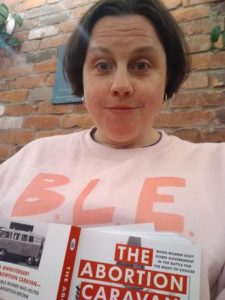
One thing I miss about those days in which we used to sit in cafes is the opportunity to flagrantly display the word “abortion” in public. A small act of resistance, but even better, I was reading an extraordinary book and my (starrred) review is now online at Quill & Quire.
Karin Wells’ book is a rich and vivid record of an event in Canadian history we all need to know better (where IS that Heritage Minute?) when a ragtag group of women travelled from Vancouver to Ottawa and shut down parliament in their protest against Canada’s unjust abortion laws, literally CHAINING THEMSELVES TO THE SEATS. (Women who worked in MPs’ offices forged them passes to the House of Commons.) It’s an incredible story and Wells tells it so well, tying the event to other activism sweeping North America at the time. (Wells speculates that the women weren’t arrested for their disruption because police were hyper conscious of optics, the Kent State killings having taken place the week before.) It’s such a good book! Read my review, and then read the book yourself. Buy a copy for your mom!
May 5, 2020
A Match Made for Murder, by Iona Whishaw
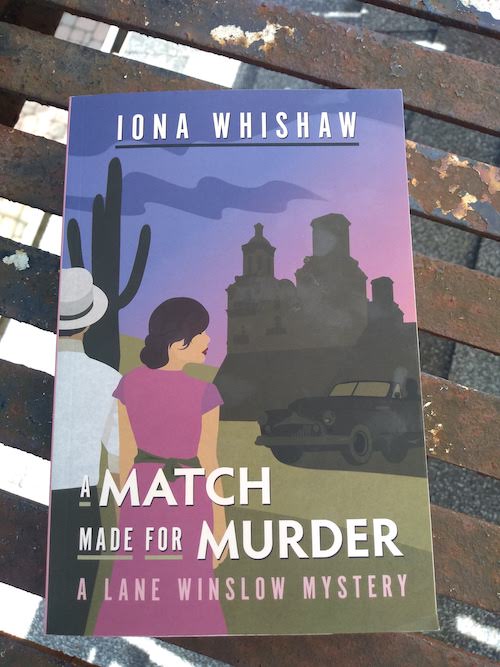
If you’ve ever wondered just how much they have to pay me to love the Lane Winslow mystery series as much as I do…the answer is nothing. And never has there been a series quite so easy to love, a series of books that has done wonders for my reputation as a person with good literary instincts, because everyone I recommend the series to loves them too, and that I get to receive a tiny bit of credit for that is marvellous luck. To have any kind of proximity to Lane Winslow is really a wondrous thing.
It never disappoints, this series, whose seventh installment is A Match Made For Murder, and Iona Whishaw has taken her heroine and her new husband on honeymoon to Tucson, Arizona. But first I’ll catch you up a bit, if you’re new to King’s Cove, the small village outside of Nelson, BC, where Lane Winslow—young, brilliant, beautiful, looking for a quiet life after spending WW2 spying for the British—retires in search of a quieter life, but she’s just got this knack for stumbling over bodies. Which brings her close to the handsome Inspector Darling—although in the first book, he’s arresting her on suspicion of murder. All that’s sorted out now, however, and the wedding has finally happened. On her honeymoon, at least, will Lane finally get the rest and relaxation she’s been seeking for the past two years?
But just while Lane is settled onto a lounge chair by the pool, reading a book (Nine Tailors, by Dorothy Sayers, naturally!), a shot rings out, and it won’t be the last one fired before the book is over. It turns out that Lane and Darling are surrounded by couples with complicated arrangements, mob connections, and possibly murderous intentions. Meanwhile, back in King’s Cove, Ames is left to unravel a curious case involving a dead man whose reputation for interfering with teenage girls goes back at least a decade, and when the woman he fancies turns out to have a connection to him, he struggles to retain his impartiality.
As always with Whishaw’s books, the novel is a delight, charming and funny, cozy and enveloping—by page 7, there are already scones. It’s also a wonderful literary homage to the classics of detective fiction, and I love that Nelson, BC, comes with its very own Baker Street. But coziness is not even the half of it—the series takes on race and racism (in this latest book, Nelson has its first Black police officer and Ames comes to understand that he gets to be regarded as an individual, while his colleague is forever representing an entire race), and misogyny, rape and spousal abuse all factor in this story, which is strongly concerned with the enormous power that men had at the time (and still have now) to control the women in their lives, and also with their sense of entitlement to that control. It’s an idea that is present in both Lane and Darling’s minds as they contemplate how their relationship might be different now that they are married—but then neither of them has ever had much taste for convention.
Lane Winslow, of course, will be keeping her name.
And here is Iona Whishaw reading from her new novel as part of 49thShelfLAUNCHPAD.
April 23, 2020
Misconduct of the Heart, by Cordelia Strube
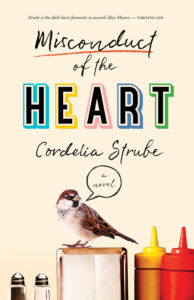
I was nervous about this book, and if you’ve ever read Cordelia Strube you’ll understand. Cordelia Strube whose previous novel was On the Margins of These Pages, There is Heartbreak, or at least it might as well have been. (The book was actually On the Shores of Darkness, There is Light, it was one of my favourite books of 2016, and won the Toronto Book Award.) But my capacity for heartbreak is so currently occupied at the moment by everything, and I can’t take any more. So I went into this warily, is what I’m saying, like the book itself was an unreliable teenage boyfriend. “Here’s my heart, Cordelia Strube,” is what I was thinking. “Be careful, please.”
Misconduct of the Heart is not a feel-good comedy. Narrator Stevie is currently sandwiched between violent assaults by her son who returned from Afghanistan with PTSD and the demands of her aging parents (her mother assaults their personal support worker and her father shits his pants), all the while Stevie herself has trauma that she’s never properly processed or admitted to anyone. She became pregnant with her son after a violent gang rape when she was a teenager, and was never able to show him affection—though her own mother and father weren’t stand-out examples of parenting either, so did anyone ever have a chance?
But they do, which is the point of this book, which is as funny as it’s dark. Populated by the characters who work at Chappy’s, the weathered franchise restaurant in suburban Toronto where Stevie works as kitchen manager, and if you’ve ever worked in a kitchen, you’ll recognize the scene. High stress, as if Stevie needs any more—but then someone drops off a child who might be the daughter of her son, and here Stevie sees the possibility of something. Redemption? Could this troubled world ever give her that much?
This is not a feel-good comedy at all, but oh it’s so richly funny. Funny in the way the world is, absurd, preposterous, sad and hilarious. “You can’t make this stuff up,” kind of funny, which is funny because Strube does, and it’s wonderful. And even feel-good, because there is hope and there is triumph, and the reader is rooting for every single one of these lovable losers to finally win.
It’s a slow build, this book, and first 100 pages are tough—the narrative is a bit disorienting, we’re not sure why we care about any of these people yet, and the story of Stevie’s past and what happened to her son is really brutal. But the reader should persist because once the story picks up, the payoff is huge, such an unrelenting kernel of light and love. There is nobody else who writes like Cordelia Strube, and this is one of my favourite books of the year.
April 16, 2020
The Union of Smokers, by Paddy Scott
I confess that I cheated a bit with this one. A book about a twelve-year-old boy, “the heroic last day in the life” according to the copy on the back, and these days I just don’t have the stomach for heartbreak, so I read the last page first to see if this was a tragedy that was survivable—for me or the character, or both, perhaps—and I determined that it was. I could take this.
So I knew what I was getting into with Paddy Scott’s The Union of Smokers, is what I mean, but did I really? In this story of Kaspar Pine, a farm kid from the outskirts of Quinton, ON, which bears an uncanny resemblance to the town of Trenton, right down to the swing bridge and the creosote plant with a propensity for catching on fire.
Not everyone takes Kaspar seriously, in fact nobody really does, except Kaspar himself. (“Getting snorted at by women is bound to happen if you’ve learned your entire repertoire of charming manoeuvres from senior citizens.”) His mother’s whereabouts are unknown, and he was brought up by his father in a kind of deprivation, until circumstances changed and he was brought to live with his maternal grandparents on a farm outside of town. They, at least, provided him with the stability and love that had been missing from his life, and a sense of identity in farming culture, which most of the people who live in town don’t properly understand.
Kaspar, a prolific smoker thanks to the collection in his butt baggie, bikes into town to replace a canary (twice) and here is where the book begins, when he meets up with Mary Lynn, love of his life, just a couple of years older, with whom years before he’d once shared a dramatic adventure while dressed in a cowboy costume, but she doesn’t remember. The two of them become yoked, and it turns out their bond is even deeper than that, although not in the way that Kaspar longs for, and Mary Lynn herself has no idea what to make of this wacky weirdo kid who won’t leave her alone and ends up using her bra as a tourniquet, but not in a sexual way.
An eccentric portrait of small town life; a narrative voice that gets in your head and proves unforgettable, a story that manages to be utterly devastating and uplifting at once thanks to a character so strangely and richly imagined, with the most indefatigable sense of himself and his story and his worth—no matter what anybody else thinks, and you’re going to take his side. Not to mention be sorry when it’s finally time to leave it. I really loved this book.
PS I picked up the book finally after its virtual launch at 49thShelf. Throughout this month and next, we’re spotlighting new releases that deserve our attention at a moment when launches and festivals have been cancelled. Hope you can pay attention to what we’re doing here and do your best to support these books and authors.
April 9, 2020
A Conversation With Tara Henley
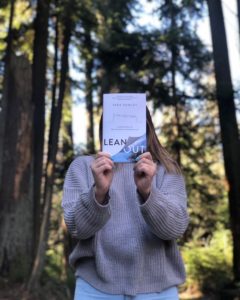
Like many of you, I found myself unable to read as this crisis arrived in our lives, perpetually in a panic, scrolling news feeds instead. Not being able to read, however, only compounded the trouble I was in, because if I’m not a reader, then who am I? And it was Tara Henley’s new memoir LEAN OUT: A MEDITATION ON THE MADNESS OF MODERN LIFE that brought me back to books again, a gorgeously written memoir that is perfectly timed for our current moment. Henley was kind enough to answer some of my questions about the book, so please read on to learn about how Madeleine L’Engle’s books expanded her vision for her life, what are the limits of self-care, and how “right now we’re seeing in stark terms the price we all pay for inequality.” I love this book so much.
April 8, 2020
How to Pronounce Knife, by Souvankham Thammavongsa

Make your book pink. Make your book slim. Put a nail file on the cover, and have your reader forget that it’s actually a blade, and this is how you do it, create a story collection that seems unassuming but will cut you with its razor edge. The “Yes, Sir” delivered in a tone that really means, “Fuck you!” And it gets under your skin, of course, a book like this, Souvankham Thammavongsa’s fifth book after four acclaimed poetry collections and her debut fiction, the short story collection How to Pronounce Knife. (Full disclosure: the writer and I were classmates twenty years ago, and I since followed her career with admiration.)
These stories are subtle, wonderful and jarring. They range between those from the perspective of children of immigrant families from Laos (reflective of Thammavongsa’s own background), children who are know before many of their classmates the way that parents are actually fallible after all, that they struggle and have limits, and stories of people awkwardly navigating social and romantic mores, failing to fit in with convention (which is another way of not failing at all—especially in a story).
In the title story, a child takes her father’s guidance on the correct way to pronounce “knife,” and learns the lessons of a lifetime in the process. In “Paris,” a woman who works in a chicken factory dreams of getting a nose job—and experiences vicarious heartbreak. A seventy-year-old woman has an affair with her young neighbour in “Slingshot,” a story with the most perfect, powerful ending.
I LOVED “Randy Travis,” the story of a family who immigrates from Laos, and the mother falls in love with country music, which helps define for her a different kind of life she desires for herself. In “Mani-Pedi,” a failed boxer who ends up with no choice but to take a job at his sister’s nail salon—but who insists on keeping his dreams. “Chick-a-Chee” is about one family’s embrace of a bizarre local ritual. “The Universe Would Be So Cruel,” awesome and heartbreaking, about a man who runs a small print shop and has an uncanny knack for knowing the future for the couples whose invitations he creates. A child considers the mystery of her mother in “The Edge of the World.” A school bus driver realizes he’s losing his wife in “The School Bus Driver.” A mother watches her daughter from afar in “You Are So Embarrassing.” The story “Ewwrrrkk” begins, “The summer I turned eight, my great-grandmother showed me her boobs.” An accountant looks for love (and potential clients) in “The Gas Station.” A childhood friendship is recalled in “A Far Distant Thing.” And a young girl goes to work with her mother in the final story, “Picking Worms.”
The stories are quiet but powerful, the sentences extraordinary, the volume as a whole is such a pleasure to read and to discover.
April 2, 2020
No More Nice Girls, by Lauren McKeon, and Lean Out, by Tara Henley
Although almost everything I was reading a month ago seems kind of irrelevant now, Lauren McKeon’s No More Nice Girls feels like it could be an exception. This underlined by the number of Canadian politicians and public health officials who are women and spearheading efforts to fight and control what’s going on right now, women we are turning to for answers and reassurance, one of whom, Deputy Prime Minister Chrystia Freeland, shows up early in McKeon’s book as as “a new kind of power that’s completely, deliberately at odds with a very old, very masculine one.”
In her book, McKeon imagines what might be possible with a different kind of power, and writes about ways that people are imagining such things already, with all-women co-working spaces, the #MeToo movement, “identity politics of lonely, angry men” as a backlash to women’s power. She writes about how conventional power doesn’t tend to work for women when they achieve it, corporate achievement as an example, where the women at the top still have to contend with the same challenges that all women do—sexism, harassment, discrimination, violence, a gender pay gap. The ways in which women have to be “better than perfect” to be accepted, while any guy in a poor fitting suit seems to fit the bill. And the limits of #GirlBoss kind of power, which is the kind of individualized, status-quo sustaining power that the patriarchy likes.
It’s difficult to synopsize McKeon’s book, whose range is so wide. She writes about race and representation; economics and federal budgets; gender and the media; how technology affects our lives and what it means that so much of technology is created by men; feminist cities; online trolling (McKeon is author of F-Bomb: Dispatches from the War on Feminism, which I read and loved in 2017); and about numerous and inspiring ways that women all over the world are raising the bar and changing the narrative on traditional notions of what a life of a woman ought to look like. It’s an incisive and inspiring read.
*
I read No More Nice Girls in “the before times” and then was unable to read anything properly for a couple of weeks, as the world before my eyes was changed into a surreal and disturbing reality. And the book that finally brought me back to reading was Tara Henley’s Lean Out: A Meditation on the Madness of Modern Life. (Full disclosure: Henley wrote a kind and generous review of my novel back in 2017. We also share an editor. Neither of these factors are why I’m so obsessed with her book, but are definitely worth noting.)
Reader, this book was a balm, as it was always meant to be—but it meant so much more than it would have even a month ago. Suffering from physical symptoms of anxiety in 2016 after a decade of living in the big city and working in journalism, Henley reached a breaking point and realized that things would have to change—but also that she was limited as to what change was possible to her as an individual, this becoming even more apparent after she moves back to her hometown Vancouver and is confronted with the city’s unaffordability. Does modern life truly have to be like this, Henley wonders? A less solipsistic Eat, Pray, Love is how I am thinking about this book.
Lean Out is rich with reporting, but underlined by Henley’s own story and family history. (It’s also gorgeously written and inspired by the works of Madeleine L’Engle, which meant a lot to me after My Year of Vicky Austin.) She writes about alternatives to the way we do work, connect with nature, eat food, make and spend money, live online, combat loneliness, find community, and make our homes. Arriving at not definitive answers, but instead broadening the range of what is possible for a more fruitful way of living both as individuals and as a society. And, as with McKeon’s book, it all comes down to inequality in the end—data shows that unequal societies, Henley writes, make life demonstrably worse for everybody, even those who are at the “top.”
Which is something all of us should keep in mind as we think about what kind of world we want to live in “when all this is over.” I am so grateful to these authors who are already doing the work of imagining new and better ways of being.
*Both these books are included on a Books With Vision list I created at 49thShelf. And an amazing Q&A with Henley will be up on 49thShelf in about a week. Stay tuned. And buy her book in the meantime—you will be glad you did.
March 5, 2020
Polar Vortex, by Shani Mootoo
At first glance, this is a novel about a love triangle. Priya, who is married to Alex (a woman), and they live together in quaint and rural Prince Edward County. But something isn’t right, even before we learn that their household is about to be disturbed by a visit from Priya’s old friend, Prakash. Even notwithstanding Priya’s erotic dream about Prakash, which opens the novel. There is a distance that stands between Priya and her wife, and also a strange, uncanny hollowness to Priya’s first-person narration—or maybe it’s not hollow, but instead there’s a kernel of something there (what?!) that the reader is not privy to.
Prakash is a very old friend, a friend that Priya has barely spoken of to Alex, though she has pointed him out in an old photo from university, a photo of the two of them alongside Priya’s first girlfriend, Fiona. And is Alex threatened because he shares a cultural heritage with Priya? They are both diasporic Indians, Prakash from Uganda (where his family was expelled and brought to Canada as refugees) and Priya from Trinidad—though Priya would argue that this isn’t such a remarkable connection. But of course there is more to it, more than even Alex knows, more than Priya is willing to admit to herself or to even remember.
The novel takes place over the course of a day, and the tension in the text can be excruciating—but in the very best way. The kind of excruciating tension that makes a book unputdownable, that causes a reader to yell at a page. Polar Vortex becomes a book about truth and memory, about how little we know each other, and ourselves. Strange, ominous, haunting, it’s a propulsive read and a deliciously unsettling one.





